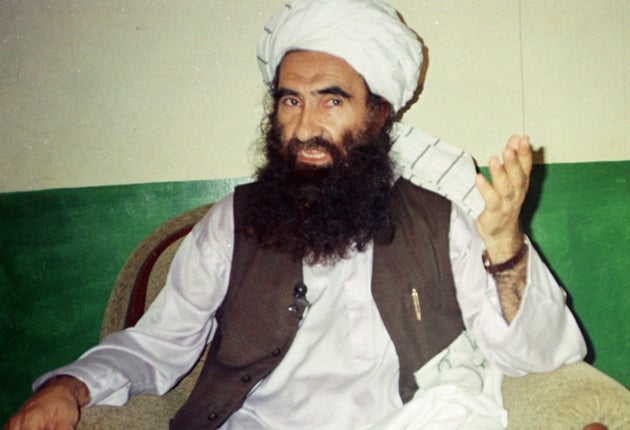Jalaluddin Haqqani death: Founder of most-feared Afghan militant network is dead, Taliban says
Haqqani network considered most formidable of the Taliban's fighting forces

Your support helps us to tell the story
From reproductive rights to climate change to Big Tech, The Independent is on the ground when the story is developing. Whether it's investigating the financials of Elon Musk's pro-Trump PAC or producing our latest documentary, 'The A Word', which shines a light on the American women fighting for reproductive rights, we know how important it is to parse out the facts from the messaging.
At such a critical moment in US history, we need reporters on the ground. Your donation allows us to keep sending journalists to speak to both sides of the story.
The Independent is trusted by Americans across the entire political spectrum. And unlike many other quality news outlets, we choose not to lock Americans out of our reporting and analysis with paywalls. We believe quality journalism should be available to everyone, paid for by those who can afford it.
Your support makes all the difference.The founder of Afghanistan’s powerful Haqqani network, one of Afghanistan’s most feared militant groups, has died at the age of 72, the Taliban has announced.
Jalaluddin Haqqani was once an ally of the US in its fight to defeat the Soviet Union in Afghanistan, but went on to become a close friend of Osama bin Laden and in 2012 the US declared the Haqqani network a terrorist organisation.
Haqqani died in Afghanistan on Monday after years of ill health, a Taliban spokesperson told the Associated Press. He had been paralysed with Parkinson’s disease for the past 10 years and long ago handed over operational control of the Haqqani network to his son, Sirajuddin.
Considered the most formidable of the Taliban's fighting forces, the Haqqani network has been linked to some of the more audacious attacks in Afghanistan.
And with Sirajuddin Haqqani in operational charge, it was not immediately clear what direct impact the elder Haqqani's death would have on the insurgent movement.
"If his excellency Haqqani Sahib has departed us physically, his ideology and methodology continue to endure," a Taliban statement said.
The Haqqani network’s unusual history began when Jalaluddin Haqqani, educated at a deeply conservative madrassa in Pakistan, agitated against Afghanistan's monarch, King Zahir Shah, in the 1970s.
During the 1980s, when Washington backed an uprising against the communist government in Kabul and its Russian allies, it was Haqqani's military prowess that brought him attention from both the US and Pakistan. He received money and weapons from the US and his was among a number of Islamist groups that defeated an invading army from Moscow.
Haqqani’s network joined forces with the Taliban when they overran Kabul in September 1996, expelling a mix of feuding mujahideen groups whose battles had left the capital in ruins.
Since then, the network has been among the fiercest foes fighting US and Nato troops in Afghanistan, and has become known for its complex, well-organised attacks as well as targeting civilians and carrying out high-profile kidnappings.
In August 1998, American cruise missiles targeted Haqqani's base in a failed attempt to kill bin Laden. Several Pakistani militants affiliated with the Harakat-ul-Mujahedeen group were killed in that attack.
In November 2001, when the Taliban were routed from Kabul, Haqqani was ordered by Mullah Omar to lead its Arab fighters to safety.
Haqqani developed close ties with Pakistan's intelligence service, known by the acronym ISI, as well as Pakistani militant groups, many of whom were being groomed by the ISI to fight India in the disputed Kashmir region.
US and Afghan officials have said the network, based in Pakistan's North Waziristan region, operated with the support of ISI. It’s a charge that has been rejected by Pakistan, which instead points to Haqqani’s early links to the US.
Join our commenting forum
Join thought-provoking conversations, follow other Independent readers and see their replies
Comments